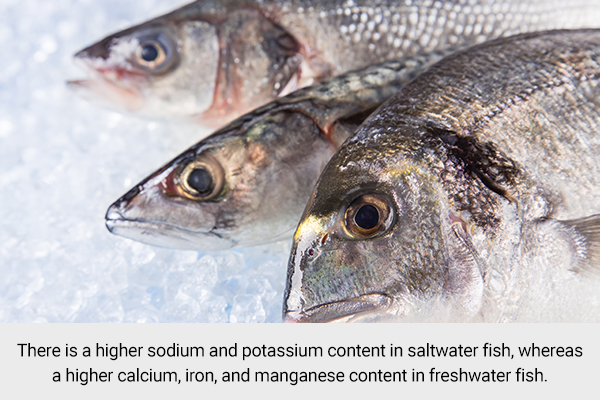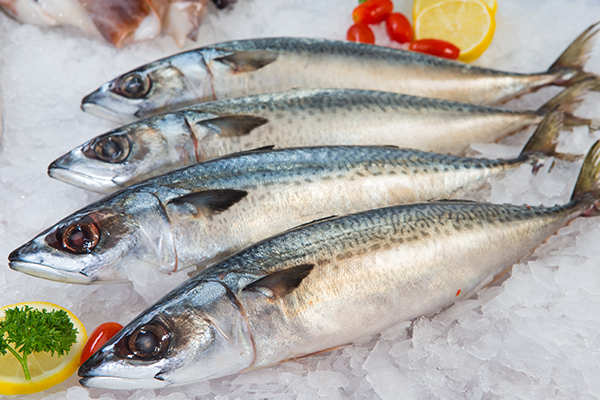In this article:
When you think of fish, you likely picture fish from the ocean such as tuna or salmon.

However, many regions of the world also heavily consume freshwater fish from lakes, rivers, and reservoirs. For landlocked regions, freshwater fishing is an important source of food and employment for those involved in inland fishery businesses. (1)
The main difference between saltwater fish and freshwater fish, as their name suggests, is the source of water body.
Though saltwater fish and freshwater fish don’t look very different from one another, their internal mechanism allows them to regulate salt within their cells differently. Since salt in freshwater is lesser than that in seawater, freshwater fishes often hold onto the salt in their bodies better than seawater fishes. (2)
Nutrients in Fish
Fish is highly recommended as a lean source of protein. Regular consumption of fish is encouraged to improve heart health and reduce the risk of heart diseases. (3)
Moreover, fish is a rich source of vitamin D, omega-3 fatty acids, iodine, and selenium. Studies have found that a high intake of fish consumption is linked to a lower risk of heart diseases. (3) This ability of fish to reduce the risk of heart disease is mainly attributed to their omega-3 fatty acid content.
By lowering inflammation and preventing the formation of triglycerides (which accumulate in blood vessels to increase blood pressure), omega-3 fatty acids also have the potential to prevent blood clots (which further prevents clogs and reduces the risk of strokes).
All of these mechanisms work together to improve overall heart health. (4)
Saltwater or Freshwater: Which Is Better for You

Largely, freshwater and saltwater fish have very similar nutrient profiles. However, experts do recommend consuming saltwater or marine fish for better health. (1)
One major reason for this recommendation is the higher content of omega-3 fatty acids in seawater fish. (1)
Some other differences include:
- Saltwater fish have a higher sodium and potassium content, whereas freshwater fish have a higher calcium, iron, and manganese content. (5)
- Freshwater fish (especially salmon and bass) have a higher vitamin A and B9 content. (6)
One study also stated that omega-3 fatty acids from saltwater fish help improve handgrip strength in men. This is particularly beneficial for people with sarcopenia, where muscles become weak and lose their strength. (7)
It can be concluded that saltwater fish is better than freshwater fish. However, based on your location and economic feasibility, freshwater fish can also be a good source of essential nutrients, particularly protein and omega-3.
A Look at Fish Safety From Heavy Metals
Mercury and selenium are the two main heavy metals fish are often contaminated with, and their levels vary in different species of fish.
A study found that commercial marine or saltwater fish had greatly varying ratios of mercury levels with whiting fish being the highest. In freshwater fish, black crappie was found to be the highest and bowfin fish was lowest in mercury levels. (8)
There is great variation in physiological and morphological features of different fish species, hence mercury concentration will also differ as per different species irrespective of the water environment, because there can be different species in the same environment, so mercury concentration can be different in fishes of the same environment whether it is saltwater/freshwater fish.
Atlantic bluefin tuna, swordfish, Atlantic mackerel, barramundi, and albacore showed higher amounts of mercury as compared to European seabass, gilthead seabream, and European anchovy of saltwater fish. (9)
However, freshwater fish, on the other hand, are lower in mercury as compared to saltwater fish, with bass being the species with the higher mercury levels. Generally, younger fish tend to have lesser mercury content than older fish. (10)
Most-Asked Questions
Should I only eat saltwater fish?

Sea fish might not be easily available in landlocked regions where transport costs can add up to the price of the fish itself. Inland fishing from lakes and rivers can provide a good way to source fish for such regions. Therefore, choose your fish option based on ease and convenience.
What are some of the freshwater fish I can consume?
Based on your region, fish species can vary. Inquire at your local fishery to identify what fish you can consume.
Practical Takeaways
- Saltwater fish are obtained from seas and oceans, whereas freshwater fish are from rivers and lakes.
- Generally, all fish contain good amounts of vitamin D and omega-3 fatty acids and are very beneficial for the prevention of heart disease.
- Saltwater fish has a higher omega-3 content than freshwater fish and is recommended.
- Depending on region and species, some freshwater fish may also be rich in certain minerals such as iron and manganese.
- Was this article helpful?
- YES, THANKS!NOT REALLY


